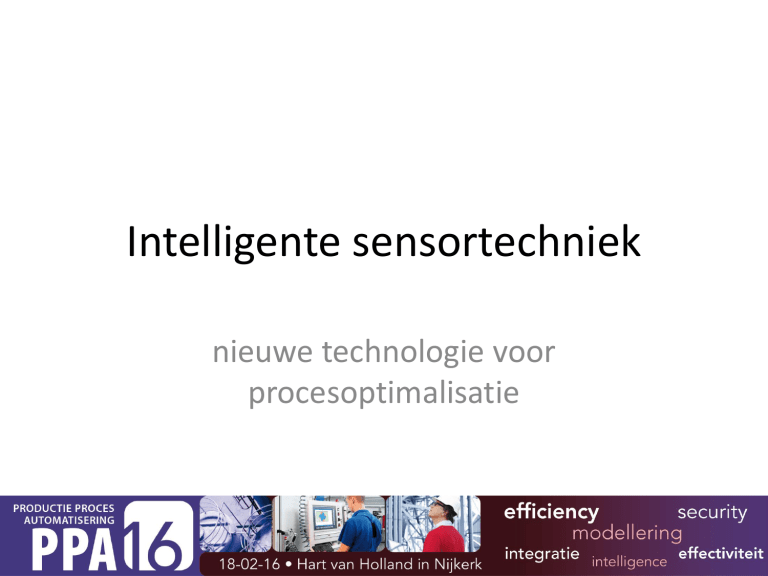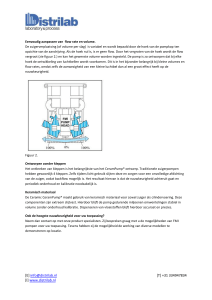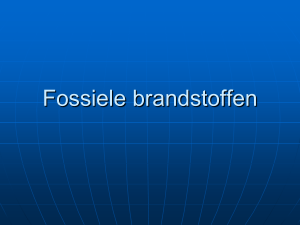
Intelligente sensortechniek
nieuwe technologie voor
procesoptimalisatie
1. Inleiding
2. Micro Vlam Ionisatie Detector (µFID)
3. Micro Massaspectrometer (µMS)
4. MR multiphase flowmeting
Intelligente sensortechniek; nieuwe technologie voor
procesoptimalisatie
Agenda
1. Inleiding
2. Micro Vlam Ionisatie Detector (µFID)
3. Micro Massaspectrometer (µMS)
4. MR multiphase flowmeting
Intelligente sensortechniek; nieuwe technologie voor
procesoptimalisatie
Agenda
Visie: Decentrale Procesanalyse
Veldinstrumenten op basis van geminiaturiseerde Proces Analyse Technologie
Stand der Techniek
Visie
Gebruik van PAT-instrumenten in Field Cabinet
µPAT als veldinstrument
Multiplexen van meerdere meetplaatsen
Meerdere meetplaatsen verdeeld over het proces
Eigenschappen
Eisen
Lastige, vaak lange sample leidingen
Lagere kosten
Meetvertraging en discontinue meting
Laag verbruik
Komplexe procesregeling
Robuust en herleidbaar naar referenties
Eisen t.a.v. explosieveiligheid
Explosieveiligheid
µPAT
µPAT
PAT
µPAT
µPAT
µPAT
µPAT
µPAT
µPAT
4
| 2106-16-02
Intelligente sensortechniek; nieuwe technologie voor procesoptimalisatie
1. Inleiding
2. Micro Vlam Ionisatie Detector (µFID)
3. Micro Massaspectrometer (µMS)
4. MR multiphase flowmeting
Intelligente sensortechniek; nieuwe technologie voor
procesoptimalisatie
Agenda
Vlam Ionisatie Detektor (FID)
Meetprincipe
Selectief ten opzichte van (CxHy)
Signaal proportioneel met het aantal
organisch gebonden koolstofatomen
totale koolwaterstof analyse
Ionisatie in een waterstofvlam,
Ionenstroommeting
Conventionele brander
-
6
Waterstof (~ 30 ml/min)
Gezuiverde lucht (~ 300 ml/min)
Ontsteking: verwarmingselement
Vlambewaking: Thermistor
Probe (~ 30 ml/min)
Ionenstroom in elektrisch veld (U ≈ 200 V)
Ionenstroommeting (pA-meter)
| 2015-12-01
| Intelligente sensortechniek; nieuwe technologie voor procesoptimalisatie
Vlam Ionisatie Detektor (FID)
Meetprincipe
Selectief ten opzichte van (CxHy)
Signaal proportioneel met het aantal
organisch gebonden koolstofatomen
totale koolwaterstof analyse
+
+
-
Ionisatie in een waterstofvlam,
Ionenstroommeting
-
Conventionele brander
-
7
Waterstof (~ 30 ml/min)
Gezuiverde lucht (~ 300 ml/min)
Ontsteking: verwarmingselement
Vlambewaking: Thermistor
Probe (~ 30 ml/min)
Ionenstroom in elektrisch veld (U ≈ 200 V)
Ionenstroommeting (pA-meter)
| 2015-12-01
| Dezentrale Prozessanalyse mittels miniaturisierter Sensorik
A
Air
H2
Sample
Muster
µFID opgebouwd uit Silicium en Glas
Resultaten
Parameter
13 | 2015-12-01
Tegenstroom-µFID
conventionele FID
Waterstofflow (ml/min)
7.5
30
Zuurstofflow (ml/min)
10 (zuurstof)
300 (lucht)
Gevoeligheid (mC/g)
14
13
P-P Ruis (pA)
< 1.0
0.4
Proof limiet (ng/s)
< 0.15
0.06
Proof limiet (ppm)
< 3.4
| Dezentrale Prozessanalyse mittels miniaturisierter Sensorik
µFID
Samenvatting en ontwikkeling
Uitdaginging voor
Silicium-Glas-Technologie
Oplossingsrichting: keramische
meerlagentechnologie (LTCC/HTCC)
Thermische stress
Robuuste dikke film technologie
Elektrische und flowtechnische opbouw en
verbindingstechniek
Betrouwbaarheid van het dunne film electrode
systeem
14 | 2015-12-01
| Dezentrale Prozessanalyse mittels miniaturisierter Sensorik
µFID
Samenvatting en ontwikkeling
onderaanzicht
Uitdaginging voor
Silicium-Glas-Technologie
Oplossingsrichting: keramische
meerlagentechnologie (LTCC/HTCC)
Thermische stress
Robuuste dikke film technologie
Elektrische und flowtechnische opbouw en
verbindingstechniek
Keramische Monoliet geen thermische stress
Betrouwbaarheid van het dunne film electrode
systeem
15 | 2015-12-01
| Dezentrale Prozessanalyse mittels miniaturisierter Sensorik
SMD (Surface Mount Device) behuizing met
elektrische en flow connecties
1. Inleiding
2. Micro Vlam Ionisatie Detector (µFID)
3. Micro Massaspectrometer (µMS)
4. MR multiphase flowmeting
Intelligente sensortechniek; nieuwe technologie voor
procesoptimalisatie
Agenda
Massaspectrometer
Sample
toevoer
Ionen-bron
Massafilter
Detector
Elektronica
Vacuüm
Voordelen van miniaturisering
Reproduceerbare massaproductie met lage productiekosten
Geringe gewicht en volume
Schok- en vibratiebestendig
Laag stroomverbruik
Relatief hoge bedrijfsdruk (druk< 1 Pa in plaats van < 1 mPa)
Integratie van Ionenbron, massafilter en detector
17 | 2015-12-01
| Dezentrale Prozessanalyse mittels miniaturisierter Sensorik
HMI
Mikro-Massaspectrometer
Voorbeeldspectrum van Methaan
Huidige Performance:
Oplossend vermogen m/Δm = 43
Massabereik ≥ 1
Proof limiet < 1 %
26 | 2015-12-01
| Dezentrale Prozessanalyse mittels miniaturisierter Sensorik
Micro-Massaspectrometer
Demonstrator
Volledige integratie van alle componenten in een 19“behuizing
µMS-module
Vacuüm-systeem
Sample gas toevoer
Plasmagas container
Gastoevoer op basis van kleppen
en capillairen
Elektronica
Verdere miniaturisatie mogelijk
27 | 2015-12-01
| Dezentrale Prozessanalyse mittels miniaturisierter Sensorik
1. Inleiding
2. Micro Vlam Ionisatie Detector (µFID)
3. Micro Massaspectrometer (µMS)
4. MR multiphase flowmeting
Intelligente sensortechniek; nieuwe technologie voor
procesoptimalisatie
Agenda
Multiphase Flow Meting met Magnetische Resonantie
André Boer
Multiphase Flow
30
NFOGM handbook of MPFM
Multiphase Flow
31
NFOGM handbook of MPFM
Complex flow, several different flow regimes
Heavy unsteady flow conditions
In addition to GVF also WLR variation
Stratified Flow
32
Multiphase flowloop bij KROHNE R&D
Multiphase Flow
33
NFOGM handbook of MPFM
Complex flow, several different flow regimes
Heavy unsteady flow conditions
In addition to GVF also WLR variation
Plug Flow
34
Multiphase flowloop bij KROHNE R&D
Multiphase Flow
35
NFOGM handbook of MPFM
Complex flow, several different flow regimes
Heavy unsteady flow conditions
In addition to GVF also WLR variation
Slug Flow
36
Multiphase flowloop bij KROHNE R&D
Magnetische Resonantie
principe
Magnetische Resonantie is een verschijnsel dat meting van waterstof
atomen mogelijk maakt als deze zich in een magnetisch veld
bevinden en geexciteerd worden met een elektromagnetische puls
Olie, gas en water bevatten
waterstof atomen (H)
Waterstof atomen bestaan uit een
kern (proton) en een electron (e-)
Een proton heeft spin, resulterend
in een klein magnetisch moment
In combinatie met een extern
magnetisch veld, en EM pulsen,
kunnen waterstof atomen worden
gemanipuleerd
37
Magnetische Resonantie
principe
Waterstof atomen die zich in een magnetisch veld bevinden en geexciteerd worden met
EM pulsen geven MR signalen af die gedetecteerd kunnen worden
•
•
•
•
•
38
Random oriëntatie van
waterstof atomen
Oriëntatie in het magnetische
veld
Precessie van de atomen
Stimulatie met EM puls
Detectie van het echo signaal
Magnetische Resonantie
flow snelheid meting
Meting van de afname van het MR signal
doordat de vloeistof uit de meetsectie
stroomt
39
Magnetische Resonantie
vloeistof fractie meting
De signaal amplitude is een maat
voor de vloeistof fractie
40
Magnetische Resonantie
gas fractie meting
Signaal100% vloeistof
Vloeistof
41
Magnetische Resonantie
gas fractie meting
gas
Signaal100% vloeistof
olie
water
42
Signaalvloeistof,actual
Het ‘missende’
signaal
vertegenwoordigt de
gasfractie
Magnetische Resonantie
olie & water meting
olie
•
•
•
•
•
Alleen de hoofdmagneet ingeschakeld
Olie magnetiseert snel
Water magnetiseert traag
Olie reageert op de EM pulsen
Signaal van olie wordt gedetecteerd
43
water
Magnetische Resonantie
olie & water meting
olie
•
•
•
•
Alle magneten ingeschakeld
Olie magnetiseert snel
Water magnetiseert traag
Zowel olie als water
•
Worden gemagnetiseerd
•
Reageren op de EM pulsen
Signaal van olie en water wordt
gedetecteerd
•
44
water
Magnetische Resonantie
olie & water meting
Hoofdmagneet ingeschakeld
olie meting
Alle magneten ingeschakeld
olie en water meting
•
•
45
De signaal amplitude geeft de vloeistof fractie
De verhouding tussen de gemeten signalen geeft de olie-water
verhouding
Magnetische Resonantie
Samenvatting
Een meet principe:
Magnetische Resonantie
Vier ‘stappen’:
1. Convective decay
vloeistof snelheid
2. Magneet lengte
olie-water verhouding
3. Signaal amplitude
vloeistof en gas fractie
4. Imaging / slicing
gas snelheid
Gas
Olie
Water
46
Magnetische Resonantie
Samenvatting
De fractie van olie, gas en water is bekend
De snelheid van olie, gas en water is bekend
Fractie
Vloeistof snelheid
gas
olie-water verhouding
F gas
olie
water
Vloeistof en gas fractie
Folie
F water
gas snelheid
Volumetrische flow
rate
De volumetrische flowrate van olie, gas en water kan berekend worden
•
Geldig voor elk multiphase mengsel dat moleculen met waterstof atomen
47
bevat.
Magnetische Resonantie
Applicatie
The multiphase flow meter co-developed by Krohne and Shell and
deployed at NAM Rotterdam
Magnetische Resonantie
Applicatie
The multiphase flow meter co-developed by Krohne and Shell and deployed at
NAM Rotterdam
Magnetische Resonantie
Applicatie
The multiphase flow meter co-developed by Krohne and Shell and deployed at
NAM Rotterdam
Intelligente sensortechniek; nieuwe technologie voor procesoptimalisatie,
conclusie en outlook
Miniaturisatie van FID en Massaspectrometrie geeft de
mogelijkheid
•
Integratie in bestaande veldinstrumenten
•
Lage productiekosten
•
Toepasbaar op veel plaatsen in het proces
Toepassing van MR technologie
•
Meting van multiphase mengsels
•
Veel extra informatie m.b.t. mengsel samenstelling en flowregime
Nabije toekomst veel meer data beschikbaar uit het veld
•
Concepten ontwikkelen voor locale intelligentie
•
Meerdere netwerken, context georiënteerd
51
Bedankt voor uw aandacht!











